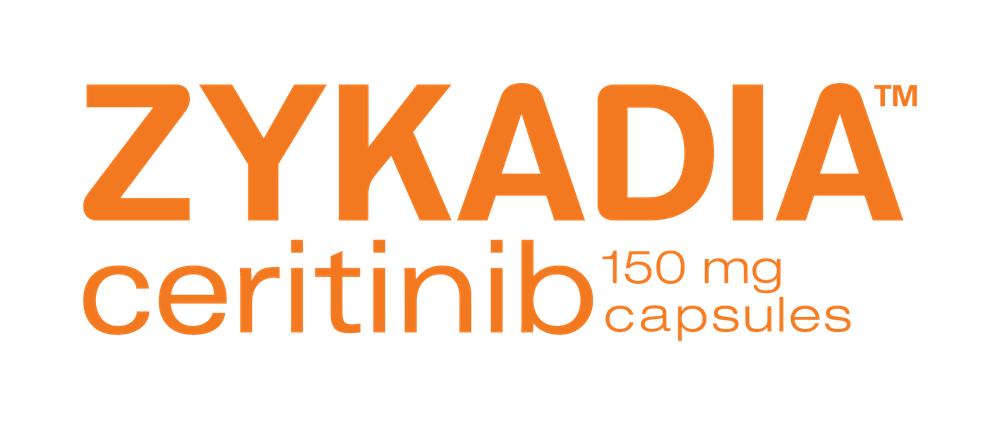Introduction
Zykadia (ceritinib) is an oral, small molecule tyrosine kinase inhibitor developed by Novartis Pharmaceuticals. It received accelerated FDA approval in April 2014 for the treatment of ALK-positive metastatic non-small cell lung cancer (NSCLC) following progression on or intolerance to crizotinib. As a second-generation ALK inhibitor, Zykadia represents a significant advancement in targeted therapy for this molecularly-defined NSCLC subtype.
Mechanism of Action
Ceritinib functions as a potent and selective inhibitor of anaplastic lymphoma kinase (ALK). It competitively binds to the ATP-binding site of ALK, inhibiting its autophosphorylation, ALK-mediated phosphorylation of downstream signaling proteins, and proliferation of ALK-dependent cancer cells. Ceritinib demonstrates approximately 20-fold greater potency than crizotinib in enzymatic assays. The drug also inhibits insulin-like growth factor 1 receptor (IGF-1R), insulin receptor (InsR), and ROS1, which may contribute to its clinical activity and toxicity profile.
Indications
- Treatment of patients with metastatic non-small cell lung cancer (NSCLC) whose tumors are anaplastic lymphoma kinase (ALK)-positive as detected by an FDA-approved test
- Indicated after progression on or intolerance to crizotinib
- FDA-approved as first-line treatment for ALK-positive metastatic NSCLC (based on ASCEND-4 trial results)
Dosage and Administration
Standard dosing: 450 mg orally once daily with food
Administration: Take at the same time each day with a meal to improve gastrointestinal tolerance
Dose modifications:
- For severe intolerable adverse reactions: interrupt therapy, then resume at reduced dose of 300 mg daily
- If adverse reactions persist at 300 mg: reduce to 150 mg daily
- If unable to tolerate 150 mg daily: permanently discontinue
Special populations:
- Hepatic impairment: Reduce dose by one-third in patients with severe hepatic impairment (Child-Pugh Class C)
- Renal impairment: No dose adjustment recommended for mild to moderate impairment; use with caution in severe impairment
- Pediatric use: Safety and effectiveness not established
- Geriatric use: No overall differences in safety or efficacy observed
Pharmacokinetics
Absorption: Median time to peak concentration (Tmax): 4-6 hours; bioavailability increased with high-fat meal
Distribution: Mean volume of distribution: 4,230 L; protein binding: 97%
Metabolism: Primarily hepatic via CYP3A4; forms inactive metabolites
Elimination: Mean elimination half-life: 41 hours; fecal excretion (92%, mostly as unchanged drug); renal excretion (1.3%)
Steady-state: Achieved within 15 days with once-daily dosing
Contraindications
- Hypersensitivity to ceritinib or any component of the formulation
- Concurrent use with strong CYP3A inhibitors and inducers (unless no alternative exists and benefits outweigh risks)
Warnings and Precautions
Severe GI toxicity: Diarrhea, nausea, vomiting, or abdominal pain may occur; provide antiemetics and antidiarrheals
Hepatotoxicity: Monitor liver function tests; may require dose reduction, interruption, or discontinuation
Pneumonitis: Interstitial lung disease/pneumonitis reported; permanently discontinue if diagnosed
QT interval prolongation: Monitor ECG and electrolytes; dose modify for QTc >500 msec
Hyperglycemia: Monitor glucose; may require antihyperglycemic agents
Bradycardia: Monitor heart rate and blood pressure
Pancreatitis: Monitor lipase and amylase; interrupt and resume at reduced dose upon resolution
Embryo-fetal toxicity: Can cause fetal harm; advise effective contraception
Drug Interactions
Strong CYP3A inhibitors (ketoconazole, clarithromycin): Increase ceritinib exposure; avoid concurrent use
Strong CYP3A inducers (rifampin, carbamazepine): Decrease ceritinib exposure; avoid concurrent use
CYP3A substrates (midazolam): Ceritinib may increase concentrations of sensitive substrates
Gastric acid-reducing agents: Avoid concomitant use with proton pump inhibitors; separate H2-receptor antagonists and antacids by several hours
Drugs that prolong QT interval: Increased risk of QT prolongation with concomitant use
Adverse Effects
Most common (≥25%): Diarrhea (86%), nausea (80%), vomiting (60%), abdominal pain (54%), fatigue (52%)
Grade 3/4 reactions: Elevated ALT (27%), elevated AST (17%), hyperglycemia (13%), diarrhea (6%)
Serious adverse reactions: Pneumonitis (4%), QT prolongation (2%), hepatotoxicity, hyperglycemia, bradycardia
Monitoring Parameters
Baseline: ALK mutation status, ECG with QTc measurement, liver function tests, fasting blood glucose, lipase/amylase, electrolytes
During treatment:
- Liver function tests: every 2 weeks for first month, then monthly
- ECG: periodically, especially in patients with cardiac risk factors
- Glucose: regularly
- Lipase/amylase: regularly
- Signs/symptoms of pneumonitis: continuously
- Therapeutic response: CT scans every 6-8 weeks initially
Patient Education
- Take with food to reduce gastrointestinal side effects
- Do not crush or break capsules
- Report any new or worsening respiratory symptoms immediately
- Maintain adequate hydration, especially if experiencing diarrhea
- Inform all healthcare providers about Zykadia use before starting new medications
- Use effective contraception during treatment and for at least 3 months after final dose
- Regular monitoring of laboratory values is essential for safety
- Report heart palpitations, dizziness, or fainting
- Manage nausea and diarrhea with prescribed medications and dietary modifications
References
1. U.S. Food and Drug Administration. ZYKADIA (ceritinib) prescribing information. 2022.
2. Shaw AT, Kim DW, Mehra R, et al. Ceritinib in ALK-rearranged non-small-cell lung cancer. N Engl J Med. 2014;370(13):1189-1197.
3. Crinò L, Ahn MJ, De Marinis F, et al. Multicenter phase II study of whole-body and intracranial activity with ceritinib in patients with ALK-rearranged non-small-cell lung cancer previously treated with crizotinib: ASCEND-2. J Clin Oncol. 2016;34(24):2866-2873.
4. Soria JC, Tan DSW, Chiari R, et al. First-line ceritinib versus platinum-based chemotherapy in advanced ALK-rearranged non-small-cell lung cancer (ASCEND-4): a randomised, open-label, phase 3 study. Lancet. 2017;389(10072):917-929.
5. National Comprehensive Cancer Network. NCCN Guidelines: Non-Small Cell Lung Cancer. Version 3.2023.


